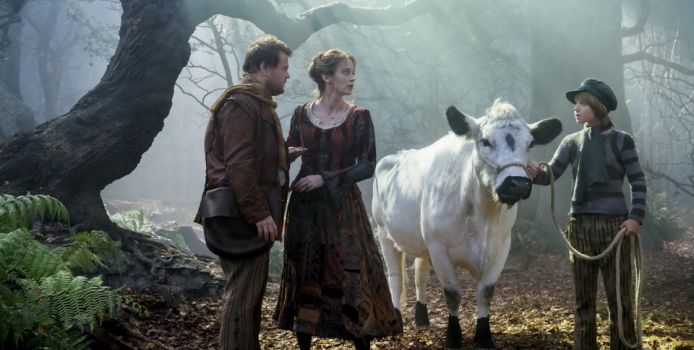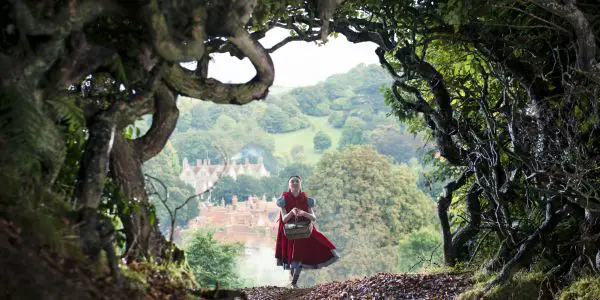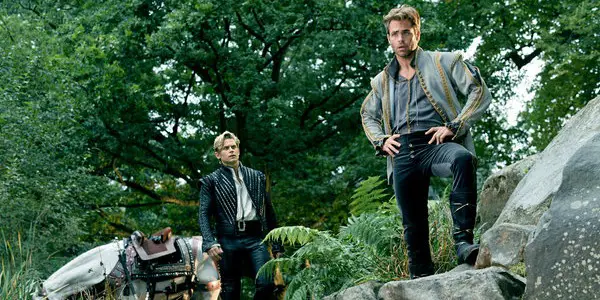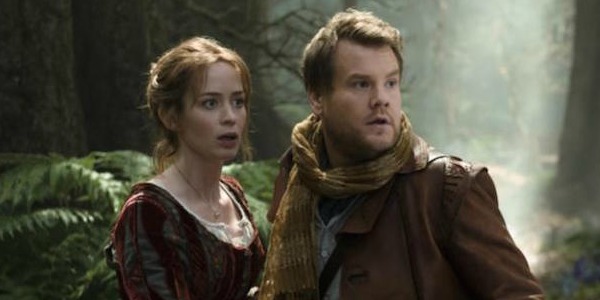INTO THE WOODS: A Musical That Can’t See The Wood For The Trees

I love film, more than people probably, and I will…
Into The Woods is a big screen adaptation of the Stephen Sondheim musical of the same name, adapted by the writer of the original musical book, James Lapine, and directed by Rob Marshall (of Chicago fame). The film boasts a number of successful actors in musical roles. When I first heard of the film, this was enough to pique my curiosity, but as the release date approached my enthusiasm for it lessened.
Maybe it was the lack of attention paid to it in the media (who were clearly distracted by other Oscar fare); perhaps it was because I was unfamiliar with the musical and, as such, knew none of the songs. But ultimately, it might have been because, like with most films, I just had a feeling. And like the feeling of walking into a dark, mysterious wood, that feeling was bad.
It’s not awful
Now, Into The Woods is not awful. Although the fact that I proclaimed that so quickly, would lead you to think that there is something awful within it. It is, in fact, the worst kind of film. It’s a wonderful film combined with a truly bad one. Let’s start with the wonderful. The story is quite intriguing. It combines a number of already notorious fairy tales, and retells them from a new angle in an effort to offer them depth.

James Corden is the central character as The Baker, his wife is played by Emily Blunt, and together they learn that The Witch (Meryl Streep) has placed a curse on The Baker’s family, making them childless. She then sets them off on a search for the fairy tale objects that may undo the curse, and to where must they go? Into the woods of course. There they cross paths with Cinderella, Jack (of beanstalk fame), Rapunzel, and Little Red Riding Hood.
It is in these characters, and especially in the performances of the cast, that the film finds its saving grace. James Corden is on top form; it is a joy to watch him perform and I really can’t fault him. I was also very impressed with the young Lilla Crawford as Little Red Riding Hood. This was her first film, having previously worked on stage musicals, and her acting prowess, her comic timing, and of course her singing is to be lauded. The other cast members (Emily Blunt, Meryl Streep and Anna Kendrick) are equally remarkable, as are the supporting actresses, Christine Baranski and Lucy Punch, in their particularly memorable small but comedic roles.
But the most astounding surprise of Into The Woods is to be found in Chris Pine. I, for one, did not expect him capable of such a fine performance. Pine is usually to be found playing a basic good guy with the same look, the same haircut. He is, unfortunately, always quite forgettable. But in Into The Woods he really does shine. As Prince Charming he is sexy and swarthy, whilst also exhibiting a strange threat about him. A threat that makes you aware of his ability to be perhaps both hero and villain. His singing range is impressive, and his vocal and comedic performance of “Agony” (alongside Billy Magnussen) is, by far, the highlight of the film.

On top of the performances are the impressive visuals. Never being heavy handed with the CGI, Marshall manages to convey a story that feels tangible, and not so fantastical as to alienate its audience. The task of the director adapting a stage musical will never be an easy one, and I am constantly impressed by those who manage to deliver. But here endeth all that’s good about Into The Woods.
ZZZzzz…
Into The Woods is… boring. While the basic premise is interesting, the story itself takes a while to get going, and for the brief period that the story is gripping, the musical numbers, unfortunately, are just terrible. As far as I know, Stephen Sondheim is one of the greatest modern musical composers. But the songs in Into The Woods are really awful. They’re repetitive and bland, and never take off into the kind of songs we would expect from a musical, with the exception of “Agony.” It is surprising that they did not find more words to rhyme with ‘woods’, and also unfortunate because, towards the end of the film, they say ‘woods’ a lot. But by this point the musical numbers aren’t the issue anymore, as the story begins to break up and confuse itself.
Into The Woods is ultimately a piece about the optimism of the fairy tale. About how that optimism is not necessarily founded and how these characters are still essentially people, capable of negligence and betrayal. But the musical would also lead you to believe that the woods themselves are a corrupting force, which I find a confusing point. Are the woods a bad thing? A good thing? Are they a metaphor for the trails and tribulations of life? It’s something that is never fully resolved, and frankly the about turn in the fates of some of the characters is wholly discomforting.

Into The Woods has clearly been adapted for the screen in an effort to cash in on the current trend for the darker fairy tale. While, once upon a time, Disney shined and polished Grimms’ Fairy Tales for children, but fairy tales are now broken apart and re-imagined in the Gothic style that Tim Burton and Christopher Nolan have brought to the screen. Red Riding Hood, Snow White And The Huntsman, and Maleficient are all ‘re-imaginings’ of these stories.
But this trend does not feel like some effort to adapt and reveal the original Grimms’ Fairy Tales. No, this trend, this problem, seems founded on some idea that we are some brave new world that no longer need happy endings. In fact, we are boastful in our cynicism. We would decry those that re-adapt or re-imagine films we loved as children. But when it comes to resurrecting another fairy tale we are triumphant in our belief that we don’t need to believe in happy endings anymore. It’s a sad state of affairs. We are becoming cynical, and the films are following suit.
Conclusion
Ultimately, Into The Woods is an interesting idea. But as a musical film, it is nothing greater than a number of mostly terrible songs performed brilliantly. The story, while seeking to point us in the direction of some noble thought about how testing life is, becomes disordered and confuses itself. If you are a fan of any of the actors in this film I would definitely recommend you watching it. Because the performances are what keeps Into The Woods energetic and alive. But don’t expect great entertainment, because in the maze of unpleasant musical numbers, self-congratulatory fairy tale analysis, and confused cautionary tales, you’ll find that you won’t be able to see the wood for the trees.
What is your opinion of the contemporary take on these old fairy tales? Would you prefer they remained as the Disney films of your childhood? Would you like to see the original Grimms’ Fairy Tales adapted for the cinema?
(top image source: Walt Disney Studios Motion Pictures)
Does content like this matter to you?
Become a Member and support film journalism. Unlock access to all of Film Inquiry`s great articles. Join a community of like-minded readers who are passionate about cinema - get access to our private members Network, give back to independent filmmakers, and more.
I love film, more than people probably, and I will watch pretty much anything. Seriously, anything! I have a postgraduate education in film & have spent an exceptionally long time trying to get inside the film industry. I'm a big believer in treating every film the same, and bringing something new to the film theory table, giving reasons for every argument made. You'll find that I'm an empathetic and fun sort of reviewer, at least, I like to think so. If I'm not watching films I'm doing exceptionally nerdy stuff, like watching documentaries about the history of medicine and collecting photos of old post boxes.













